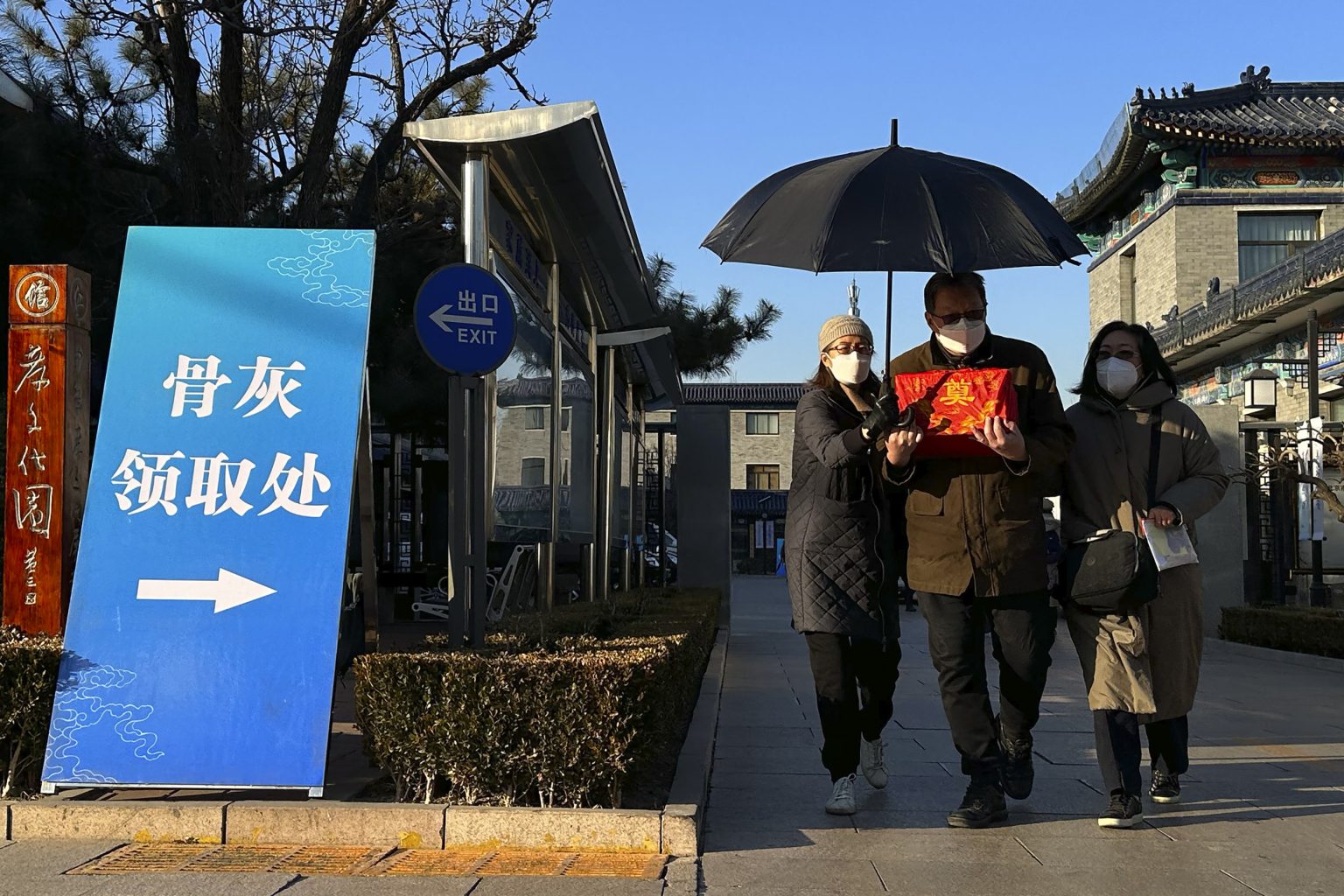Summarize this content to 2000 words in 6 paragraphs Prosecutors in northern China have charged dozens of suspects in a decade-long scheme in which corpses marked for cremation were instead sold to one of the country’s largest biomaterial firms, a company with ties to the state.Owners and operators of Shanxi Osteorad Biomaterial Co. and Sichuan Hengpu Technology Co. are accused of receiving more than 4,000 cadavers via illegal means, allowing the former to turn over nearly $53 million in revenue from 2015-2023.The alleged corpse trafficking spanned at least seven provinces and nearly a dozen localities, where dead bodies were either transferred, dissected, stored or turned into material devices for bone-grafting procedures, according to a leaked May indictment by the Taiyuan People’s Procuratorate in Shanxi province.
Mourners walk with the cremated remains of their loved one outside a crematorium, past a sign that reads “cremated remains collection point,” in Beijing, China, on December 31, 2022. During the COVID-19 pandemic, cremations rose…
Mourners walk with the cremated remains of their loved one outside a crematorium, past a sign that reads “cremated remains collection point,” in Beijing, China, on December 31, 2022. During the COVID-19 pandemic, cremations rose several-fold, leaving many funeral homes overburdened.
More
Ng Han Guan/AP
The case involves at least 75 suspects, including funeral home managers, doctors and company shareholders. The wide investigation was still ongoing as of Thursday, prosecutors told the Shanghai news site The Paper.The report was carried briefly by Chinese state broadcaster CCTV on Thursday, but both were removed just hours later. Conversations about the topic were also being restricted on Weibo, China’s largest social media website, at the time of writing.Newsweek reached out to China’s National Health Commission for comment.Shanxi Osteorad was founded in 1999 as a subsidiary of Taiyuan’s China Institute for Radiation Protection, part of the state-owned China National Nuclear Corp. headquartered in Beijing.It is among the country’s largest bone-graft and substitutes providers in a market to be worth a half-billion dollars by the end of the decade. Its biggest shareholder also owns Sichuan Hengpu, a medical devices manufacturer.The medical industry uses bone grafting to repair injuries such as severe fractures. Bone tissue can be obtained from the patient—an autograft—but possible complications mean it is commonly harvested from cadavers—an allograft—with donor consent and strict regulatory oversight.Shanxi Osteorad was accused of forging donor agreements to create allogeneic bone implant material used to treat Chinese patients. Its staff also mistreated cadavers, prosecutors alleged.In China, the biomedical devices market is overseen by the National Medical Products Administration. The funeral industry falls under the Civil Affairs Ministry. Newsweek reached out to both for comment.
Chinese authorities have for years encouraged small burials, sea burials or cremations to save land. The pandemic also saw a surge in cremations as families were left without access to traditional funeral rites.But four funeral homes in China’s southwestern provinces of Yunnan, Guizhou and Sichuan, as well as in the Chongqing municipality, collected cremation fees from family members before selling the corpses to two hospitals for dissection and storage, according to the indictment.Prosecutors said some family members paid for cremation services but did not wish to bring home the ashes. In other cases, unclaimed cadavers were selected instead.A staff member at Guilin Medical University’s anatomy department was alleged to have knowingly purchased at least 450 corpses from three of the funeral homes named in the complaint. The employee bought the bodies for $125 each and later sold more than 300 to Shanxi Osteorad for $1,400 each.A transplant surgeon at the Affiliated Hospital of Qingdao University, in China’s eastern Shandong province, was accused of processing and selling at least 10 corpses to Shanxi Osteorad for $1,400-$3,000 each. Newsweek reached out to both hospitals for comment.Authorities were alerted to the scandal in September 2023, when China’s National Audit Office probed the irregular earnings of the Guilin teaching hospital’s faculty member, according to The Paper.Chinese authorities seized more than 34,000 biomaterial products and over 18 tons of semi-finished goods, as well as 16 properties and 29 vehicles, it said. All suspects have reportedly admitted to their roles.








